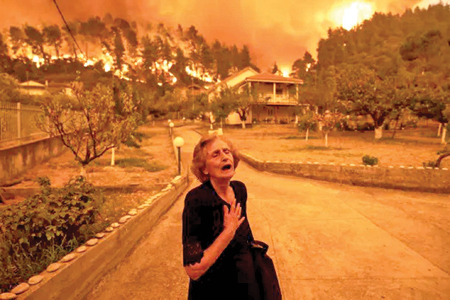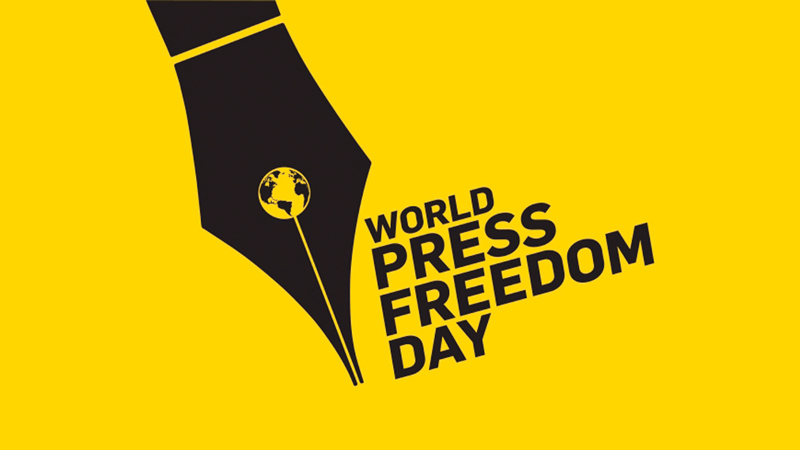 On May 3, journalists around the world marked World Press Freedom Day (WFPD), which serves as a reminder to Governments of the need to respect their commitment to press freedom. It is also a day of reflection among media professionals about issues of press freedom and professional ethics. Just as importantly, World Press Freedom Day is a day of support for media which are targets for the restraint, or abolition, of press freedom. It is also a day of remembrance for those journalists who lost their lives in the pursuit of a story.
On May 3, journalists around the world marked World Press Freedom Day (WFPD), which serves as a reminder to Governments of the need to respect their commitment to press freedom. It is also a day of reflection among media professionals about issues of press freedom and professional ethics. Just as importantly, World Press Freedom Day is a day of support for media which are targets for the restraint, or abolition, of press freedom. It is also a day of remembrance for those journalists who lost their lives in the pursuit of a story.
This year, the WPFD’s main focus was on Climate Change and loss of biodiversity, two topics which are highly relevant to Sri Lanka as well. According to the UNESCO, the climate and biodiversity crisis are not only affecting the environment and ecosystems but also impacting the lives of countless individuals worldwide. Their stories of turmoil and grief deserve to be known and shared. While not always picturesque, these narratives can even stir discomfort, yet it is through awareness that change becomes possible. Illuminating the crisis is the first step towards a solution.
That is why the role of journalists is crucial. It is through their work, their courage and their perseverance that we can know what is happening across the planet. They work on the frontlines of our collective struggle for our planet’s well-being and livable conditions. On this World Press Freedom Day, let’s celebrate their tireless efforts in shaping a better tomorrow.
On the occasion of World Press Freedom Day 2024, UNESCO launched the ‘This story must be told’ campaign, spotlighting the contributions of journalists and photojournalists in unveiling stories that deserve to be told.
In the context of the world’s Triple Planetary Crisis (Climate Change, biodiversity loss, and air pollution) disinformation and misinformation campaigns challenge knowledge and scientific research methods. Attacks on the validity of science pose a serious threat to pluralistic and informed public debate. Indeed, misleading and false information about Climate Change can, in some cases, foster doubt and incredulity about environmental issues, their impact and urgency, and undermine international efforts to address them.
Disinformation and misinformation
Disinformation and misinformation about environmental issues can lead to a lack of public and political support for climate action, effective policies, and the protection of vulnerable communities affected by Climate Change, as well as of women and girls, as Climate Change tends to exacerbate existing inequalities.
 To address this flood of disinformation in the digital ecosystem, UNESCO launched in November 2023 the Guidelines for the governance of digital platforms. If implemented in their entirety, the Guidelines will empower all relevant stakeholders to put in place a governance system that can foster freedom of expression while tackling the negative externalities.
To address this flood of disinformation in the digital ecosystem, UNESCO launched in November 2023 the Guidelines for the governance of digital platforms. If implemented in their entirety, the Guidelines will empower all relevant stakeholders to put in place a governance system that can foster freedom of expression while tackling the negative externalities.
From May 2 – 4, the Government of Chile and UNESCO hosted the 31st World Press Freedom Day Conference in Santiago. World Press Freedom Day events were dedicated to the importance of journalism and freedom of expression in the context of the current global environmental crisis. A similar event for the South Asian region was held in Dhaka, Bangladesh. At last year’s 13th Global Investigative Journalism Conference, 80 Climate Change journalists and experts from 35 countries discussed the role of investigative journalism in Climate Crisis reporting. Reporting the causes and effects of global warming in a multitude of ways and for a wide range of audiences is critical, and as humanity moves closer to the brink of a climate disaster it is essential that journalists are given the time, skills, and tools to hold officials accountable, be they in government or in the private sector.
At this meeting, priorities for accountability-focused Climate Change journalism emerged, including: The fossil fuel industry and its vast network of enablers and related industries; Government policies and promises the world over and who is influencing them; Climate Change Finance in all its complex forms; Vulnerable communities; The clean energy transition — winners and losers; Climate Change as a complex, interrelated global crisis.
The parley also found that significant challenges remain, including: Data, documents, and human sources are hard to obtain; The underlying structures of power continue to avoid transparency; The global Climate Crisis is complex and affects every reporting beat; Capacity issues are substantial across the field but especially in the Global South; New collaborative models are needed that link cause and effect; More accountability reporting is necessary, with more compelling storytelling; Public engagement is critical: climate news avoidance and distrust in climate news are significant; Disinformation and misinformation are widespread.
Regardless of one’s beat or round, be it Climate Change or Conflict, journalism is a risky profession, whichever way you look at it. All you have to do is write something that irks someone with power or influence and your life could be at risk.
Paying the ultimate price
In fact, one of the first things that they teach you in journalism is that “no story is worth your life”. Journalists are told to step away if they feel that the story they are covering could be a threat to their very lives. But journalists all over the world live on the very edge of life, earning the wrath of everyone from Governments to corrupt businessmen as a result of the stories they do and tell. Sometimes they pay the ultimate price for bravely exposing the truth. And journalists who report on wars and conflicts are sometimes targeted even when they are wearing a “Press” badge. Many journalists have already lost their lives in Ukraine and Gaza Wars.
The impunity enjoyed by those who commit the heinous crime of murdering journalists is a global problem. Sometimes the investigations come to a successful end, only for the authorities to look the other way while the perpetrators walk free. The global situation with regard to crimes against journalists is so serious that the United Nations even has a separate day to address it, apart from the Press Freedom day.
While killings are the most extreme form of media censorship, journalists are also subjected to countless threats – ranging from kidnapping, torture and other physical attacks to harassment, particularly in the digital sphere. Threats of violence and attacks against journalists, in particular, create a climate of fear for media professionals, impeding the free circulation of information, opinions and ideas for all citizens. Women journalists are particularly impacted by threats and attacks, notably by those made online.
Online violence against female journalists
According to UNESCO’s discussion paper, The Chilling: Global trends in online violence against women journalists, 73 percent of the women journalists surveyed said they had been threatened, intimidated and insulted online in connection with their work. In many cases and even in many Western countries, threats of violence and attacks against journalists are not properly investigated. This impunity emboldens the perpetrators of the crimes and at the same time has a chilling effect on society, including journalists themselves.
 More than three-quarters of the 99 journalists and media workers killed worldwide in 2023 died in the Israel-Hamas war, according to a new report from the Committee to Protect Journalists (CPJ) that highlights the grave situation for reporters on the ground.
More than three-quarters of the 99 journalists and media workers killed worldwide in 2023 died in the Israel-Hamas war, according to a new report from the Committee to Protect Journalists (CPJ) that highlights the grave situation for reporters on the ground.
CPJ counted 77 journalists and media workers killed over the first 10 weeks of the war, including 72 Palestinians, three Lebanese and two Israelis — more than have ever been killed in a single country over an entire year. A further 11 were killed in January and the first few weeks of February, bringing the total number of journalists’ deaths linked to the conflict to 88, CPJ found. Other press freedom organizations have reached an even higher death toll. The International Federation of Journalists (IFJ) estimated almost one in 10 Gaza-based journalists have been killed, despite protections for media workers under international law.
But despite the achievements made with regard to investigations in some countries, challenges still exist. The high rate of impunity for crimes against journalists persists and new forms of threats develop in an unprecedented way.
Journalists under attack
Journalists “are coming under increasing attack around the world, and this includes reporting in conflict zones,” said Scott Griffen, deputy director of the International Press Institute, a global press freedom organisation based in Vienna. Human rights laws apply to journalists and are intended to protect them, Griffen explains.
“Journalists, like civilians, are never legitimate targets in a conflict zone, and so this would mean that a deliberate attack on a journalist would be a violation of international law and those responsible would need to be held to account.”
Journalists and media houses cannot afford to hire bodyguards to protect themselves – Governments and media regulatory authorities worldwide must ensure a safe environment for journalists to work without fear and also end the impunity for crimes committed against journalists.
These journalists who laid down their lives to tell the truth will never come back, but taking these steps will at least ensure their legacy and a worry-free environment for their colleagues to carry on their critical mission.
Away from these threats, the rise of Artificial Intelligence (AI) poses another challenge to journalists and media workers as AI could be used to generate some content. Moreover, there are fears that printed newspapers could be on the way out. But as long as journalists are ready to fearlessly reveal the truth, good journalism will thrive, regardless of the medium of delivery.







